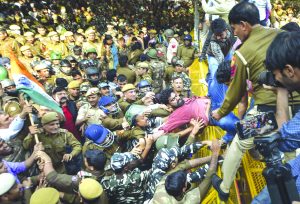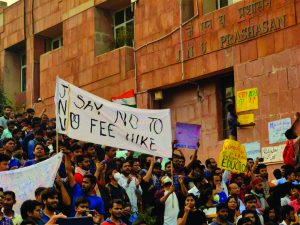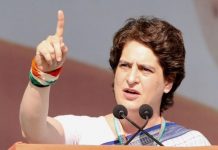 The ongoing students’ protest in Delhi’s prestigious Jawaharlal Nehru University (JNU) snowballed into a political controversy after the Opposition, Congress and CPI(M) supported the already simmering student agitation. The massive protest hogged the limelight this year not for Kanhaiya Kumar but for the students’ fight for the right to get quality education at an affordable price.
The ongoing students’ protest in Delhi’s prestigious Jawaharlal Nehru University (JNU) snowballed into a political controversy after the Opposition, Congress and CPI(M) supported the already simmering student agitation. The massive protest hogged the limelight this year not for Kanhaiya Kumar but for the students’ fight for the right to get quality education at an affordable price.
The JNU administration’s unprecedented fee hike decision stirred up a hornet’s nest and angry students hit the streets that lead to the Parliament building demanding a complete rollback of the recent hostel fee hike. Condemning excessive use of force by the Delhi Police personnel on peaceful protesters, Communist Party of India (Marxist) General Secretary and JNU alumnus Sitaram Yechury has equalled the situation with Emergency.
In a tweet, the CPI(M) leader said the university is under siege and such a massive deployment of forces was not seen before. The Delhi Police stopped forcibly stopped the JNU students marching to Parliament against the unprecedented fee hikes, Yechury added. The Congress also took a pot shot at the ruling BJP over the JNU unrest. “Just close down this institution and give these special benefits meant for JNU students to Veda Upanishad-based educational institutions…the unabated flow of taxpayer’s money has turned the JNU into a fertile ground of anti-social elements,” wrote a social media users on Twitter.
Another social media user said JNU students can afford to pay for alcohol, watch movies at Priya Cinema but when it comes to paying hostel rent, they demand subsidy. The individual also try aid the contribution made by a JNUite is minuscule to that of an IITian. The IITians also pay a huge amount of money for getting admissions and later play a bigger role in the country’s development but it is only the JNUites who resort to dafli playing over little things, the person added.
 Most of the students of the university, barring the ABVP supporters, have expressed their resentment over the unprecedented fee hike as the move could result in an estimated 3,000 or more jump in their monthly expenses. They say it’s not about freebies, but freedom.
Most of the students of the university, barring the ABVP supporters, have expressed their resentment over the unprecedented fee hike as the move could result in an estimated 3,000 or more jump in their monthly expenses. They say it’s not about freebies, but freedom.
Speaking on the issue, JNUSU general secretary Satish Chandra Yadav said the fee hike will hurt the disadvantaged students most. As a result, about 40 per cent students in 2017-18 won’t be able to pursue their studies as their monthly family income is below 12,000, Yadav added.
JNUSU former president N Sai Balaji said hostel fees was raised from 20 per month to 600 per month for single rooms, and from 10 per month to 300 per month for double rooms while a fixed fee of 1,700 was also charged in an arbitrary manner. Balaji said JNU being a leading education hub in South Asia, the fee hike by the administration is a serious concern and seems a part of draconian laws put forward by the BJP government to preserve education for the selective class. The recent fee hike would directly hit poor families since they would have to spend more money annually on educating their children as apart from the hostel fee, they will also be required to pay electricity and water bills, the former president added.
Ajay Gudavarthy, Associate Professor, Centre for Political Studies, said the JNU demands the lowest possible fee from students to ensure that students from all walks are able to get the best quality education at an affordable price. But contrary to the perception, Central universities like Visva-Bharati University, HCU, AMU, NEHU, and Pondicherry University charge less fee than the JNU.
Lending his support to the student’s protest, Professor Gudavarthy said the ongoing economic slowdown in the country might have forced the government to hike the fees but its a matter of pity that the Centre has enough money to fund the foreign tours of Modi and his Cabinet ministers; not for the masses who desperately need it.
Sharpening attack on the ruling BJP government, Gudavarthy said there is no difference between NSA Ajit Doval and riots-accused Jagdish Tytler. From fee hike to recruiting new high officials at the university, Doval tries to incur Hindutva ideology in the educational hub.
JNU students’ protest reverberated in neighbouring Delhi University also. Professor Hansraj Mehta from the University of Delhi said there is no doubt that IITs create young entrepreneurs and businessmen, but comparing them with JNU graduates is sheer foolishness. Universities create lawmakers, bureaucrats, and other high officials who make policies and govern the country, said the DU professor. “Unlike other educational institutions, JNU played an important role in the lives of students coming from economically marginalised families and for the past many years, the institution has provided exceptional exposure to the world of academia”, Mehta added.
According to Professor Mehta, JNU provides an equal opportunity to all classes of society ranged from under-privileged to metropolitan students but the university has been accused of a few allegations of elitism and caste bias, unlike other institutions that provoke caste bias and other elements in the education to suppress the lower sections of society.
Mehta claimed students from backward and economically weaker sections of the society dared to migrate to a metropolitan city like Delhi and join the JNU because of the policies taken by the university for ensuring affordable education for all and sundry encouraged them. “Today the university is proud to have created scores of students from different sections including Dalit, tribal and other backward groups who have designed their future in the world of academia, politics and other fields,” said Mehta.
All is not well at the leading varsity
Why JNU, an institution of eminence, is again in the news for wrong reasons, wonders Tehelka Bureau
The clash over fee hike between students of Jawaharlal Nehru University (JNU) and the police and subsequent defacing of the statue of Swami Vivekananda shows that all is not going well at this top learning institute of the country.
The unsavoury students-police clash began when Vice-President Venkaiah Naidu began his address. The students of the varsity, which has seen several such agitations in the recent years, were protesting outside the All India Council of Technical Education (AICTE) premises, the venue for the varsity’s third convocation, which was addressed M Venkaiah Naidu. The Union HRD Minister Ramesh Pokhriyal Nishank who had been invited as guest of honour at the convocation was not able to leave the campus for about six hours. The JNUSU office-bearers later met ‘Nishank’ who assured them that their demands would be looked into.
The students alleged that the fee and hostel charges had been increased without consulting them. The protest by students is an extension of an ongoing tussle between them and the varsity administration over different issues. The JNU Dean of Students’ Welfare Umesh Kadam last month issued a notice asking the union to vacate their office. However, the students protested the move and did not allow the administration to lock the office.
The current protest began on the day of convocation and escalated as the day progressed with crowds of angry students, with banners saying ‘Roll back fee hike’, trying to push through a wall of anti-riot police personnel to reach the venue. Several barricades put up by the police were broken by the students, who started their march towards the AICTE premises, about 3 km away from the university’s campus in south Delhi. Water cannons were used to disperse the protestors and police said some of the students were detained.
The students shouted slogans like “Police ko aage karta hai, JNU VC darta hai”. During the scuffle with police personnel, the students raised slogans like “Police-walo ki ek bimari, Tis Hazari, Tis Hazari”, referring to their clash with lawyers at the city’s Tis Hazari court a few days back. Barricades were placed outside the north and west gates of the JNU campus, as well as on the route between the AICTE auditorium and the university at Baba Balaknath Marg and nearby areas but the marching students broke one after the other.
However, the moot question is whether the stir was only because of fee hike or ideological differences between the government, the academicians and the students. The JNU was earlier also in the news after alleged seditious slogans were raised on the campus.
For many years, the JNU has been dominated by humanities and social sciences. However, of late but there is a new emphasis on natural sciences and the present Vice Chancellor Mamidala Jagadesh Kumar is from IIT Delhi. Little doubt that when the stir spread, protesting students painted messages on walls near the vice-chancellor’s office saying that “You are not our VC. Bye, Bye Mamidala Forever.”
The university might have increased the fee to weed out ‘non-serious’ students from hostels but its intent has been clouded by controversies. Students have raised objections to the compulsory attendance for MPhil and PhD courses. The students have resented the sedition charge against leveled against Kanhaiya Kumar. They have also criticised the proposal to display Army tanks on the campus to ‘instill nationalism.’ The JNU has been a centre of excellence, fostering learning in an atmosphere of free spirit and as such due diligence and care should have been taken to retain its character, eminence and world class.
Statue defaced
While authorities may be at fault for the stir at the JNU, there will always be a question mark as to why objectionable messages were written on the Swami Vivekananda Statue. By far there is no clarity on who defaced the statue, it is clear that the messages were directed to send across a message to the government. The statue is situated on the right side of the administrative block opposite the statue of Jawaharlal Nehru.
Under the new proposal by the JNU’s executive committee, the rent for a double-seater room, which was hiked to 200 per month from 10 per month earlier, has now been reduced to 100 per month.
Rent for the single-seater room, proposed at 600 per month from 20 per month earlier, has been reduced to 200 per month. The one-time refundable mess security fee has been hiked from 5,500 to 12,000. Significantly, the main bone of contention — the utility charges of 1,700 that have been introduced for the first time — have not been removed or reduced.
letters@tehelka.com











